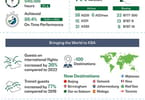If the Romanian state wanted to support tourism in Romania, it would drop the VAT for food in accommodation units, exempt incoming tourism services from paying VAT altogether and consider incoming tourism an export activity, invest in infrastructure and promote the country aggressively abroad, say tourisms specialists.
With Romania not yet a popular tourist destination like other countries in Europe, tourism agencies have asked the local authorities for several incentives that would boost the number of incoming tourists to the country.
Foreign tourists make less than a fifth of Romania’s tourism market, which is significantly lower than in other European countries. The 1.7 million foreigners who came to Romania for tourism last year spent some EUR 1 billion in the country, equivalent to a budget of EUR 635 per person, according to data from Romania’s National Association of Tourism Agencies ANAT.
While foreign tourists cover only 18 percent of the country’s tourism market in Romania, the ratios are much higher elsewhere in Europe: 67 percent in Bulgaria, 49 percent in Hungary, 53 percent in the Czech Republic, and 71 percent in Austria. In Romania, most foreign tourists come from Hungary, Bulgaria, Germany, Italy, Poland and Austria.
Foreigners prefer city breaks, tours – many of which niche ones, like cultural tours, wine tours and historic tours, and relaxation packages in Romania.
Should Romanian authorities recognize that incoming tourism is in fact a service export, the number of foreign tourists to Romania would go up, jumping from 2 percent of the GDP, to 4 percent, said Lucia Morariu, the ANAT president.
The association has asked the Romanian Government to classify incoming tourism as an export activity, which would allow all licensed tourism agencies and all accommodation units in Romania to be exempted from paying VAT, Morariu added. If Romania did this, it would stand to gain some EUR 2 million, explained Gheorghe Fodoreanu, former ANAT president and owner of a tourism agency that focuses on bringing foreign tourists in Romania.
Out of the existing 2,000 tourism agencies in Romania, only 20 rely heavily on incoming tourism, which is too little to attract a significantly higher number of foreign tourists.
For each foreign tourist brought to an accommodation unit in Romania, a tourism agency should get a certain sum- EUR 2 for each night a foreign tourist spends in a two-star hotel in Romania, for example, the association further proposed. The amounts could be subtracted from the income tax the tourism agency should pay to the state, and thus the system can become a fiscal incentive, said Alin Burcea, the first vice president of ANAT, and owner of tourism agency Paralela 45.
WHAT TO TAKE AWAY FROM THIS ARTICLE:
- For each foreign tourist brought to an accommodation unit in Romania, a tourism agency should get a certain sum- EUR 2 for each night a foreign tourist spends in a two-star hotel in Romania, for example, the association further proposed.
- If the Romanian state wanted to support tourism in Romania, it would drop the VAT for food in accommodation units, exempt incoming tourism services from paying VAT altogether and consider incoming tourism an export activity, invest in infrastructure and promote the country aggressively abroad, say tourisms specialists.
- Should Romanian authorities recognize that incoming tourism is in fact a service export, the number of foreign tourists to Romania would go up, jumping from 2 percent of the GDP, to 4 percent, said Lucia Morariu, the ANAT president.






















